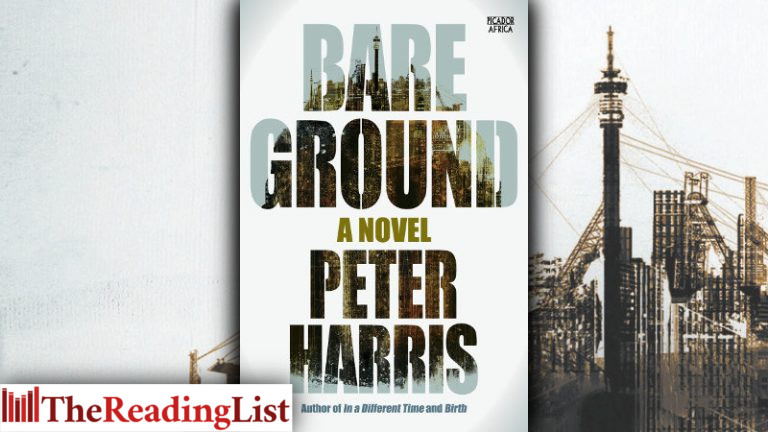Read an excerpt from Bare Ground – the debut novel from award-winning writer Peter Harris
More about the book!

Pan Macmillan SA is proud to present Bare Ground, the debut novel by acclaimed non-fiction writer Peter Harris.
Harris’s 2009 book In a Different Time: The Inside Story of the Delmas Four was awarded the prestigious Sunday Times Alan Paton award as well as the Booksellers’ Choice Award. He is also the author of the bestselling Birth: The Conspiracy to Stop the ’94 Election.

Credit: Nicolise Harding
Harris says: ‘In a Different Time was a book about the 1980s, and an extraordinary treason trial. It also chronicled the huge sacrifices that were made to bring about democracy in South Africa. My second book, Birth, was about the transition in the early 1990s and the extreme challenges that the country encountered in getting to and conducting the 1994 election, in the face of significant odds. This novel, located in the cauldron of Johannesburg, is about the society we have become.’
Esteemed author Mandla Langa has nothing but praise for the book.
‘Bare Ground is about the transient nature of dreams, but it is also an unyielding and engrossing critique of our new society, which grapples with the scourges of corruption and greed,’ Langa says. ‘The novel will lead to society’s continuing appraisal of the policies of government in the face of rapacity reminiscent of the 1886 Gold Rush.’
Click on the link above for more about the book!
Read an excerpt:
ONE
It wasn’t the first funeral Musa Madondo had attended that turned out to be an exercise in hypocrisy. Now, when the man was dead, speaker after speaker solemnly declared that he was a great man – well, almost. ‘A man who lived his life with integrity and honour,’ the first speaker declared. ‘A life of sacrifice and commitment,’ another intoned. Yet, when the man had been alive, he had felt alone, bereft of friends and company, or so he had told Musa. Why should it take a man to die for him to achieve recognition? What was it that compelled the speakers to claim him as theirs now, when they had never done so in life?
Too late, thought Musa. The man was dead and incapable of listening now. And actually, although they might never have expressed this to his face, he knew that some of the eulogisers had actively disliked him. They spoke of good times past, when they were young and immortal, before life had stamped its heavy boots on their innocence and dreams.
Each eulogy stressed the special role the speaker had played in the deceased’s life, how close they had been, and how much the man would be missed; each intimating a friendship and bond no other could claim. The pallbearers, some in dark suits, were a history lesson on their own: two government ministers, a captain of industry, a director general, two comrades in full military uniform from a time gone by, a hero of the struggle now in her seventies, and an academic whose face was familiar but whose name escaped Musa. The priest summed it up, really, quoting from the Book of Revelations. ‘And God shall wipe away all tears from their eyes; and there shall be no more death, neither sorrow nor crying, neither shall there be any more pain: for the former things are passed away … He that overcometh shall inherit all things; and I will be his God, and he shall be my son.’
Musa looked at the packed pews, seeing men and women nodding wisely, taking comfort from the words. Then the priest suddenly changing tack. ‘But the fearful and the unbelieving, and the abominable, and murderers, and whoremongers, and sorcerers, and idolaters, and all liars shall have their part in the lake which burneth with fire and brimstone; which is the second death.’ The mourners were no longer nodding. Lips were pursed; some looked straight ahead. He heard someone whisper, ‘That’s a bit rough,’ and he smiled to himself. This priest knows his congregation, he thought. A lone voice in a godless place.
Afterwards, the mourners gathered on the circular tarmac outside the Braamfontein Crematorium. Many of the gravestones in the cemetery behind were dilapidated and forlorn. Sunglasses on, people exchanged sad pleasantries, kisses on cheeks, hands on shoulders, tissues touched to eyes, meaningful hugs. ‘He was a good man.’ None mentioned how he had died. It probably didn’t help that the cause of death remained unclear, as did the circumstances of his passing. There were those who claimed this was no normal accident; that things were found in the car that told their own story; that he’d had a recent brush with the law. There was also talk of suicide, of a man tormented, driven by fear and isolation. A man at the end of his rope.
Personally, Musa had ruled out suicide. But he hadn’t ruled out murder.
TWO
If truth be told, and there was no reason why it shouldn’t be, Max Sinclair struck one as a picture of success. Certainly, his charm was a quiet one, attentive almost, regardless of who he was talking to, and people didn’t forget that. He was one of those men who are often described as being ‘hard to say no to’. And that was a fact. Not many people turned Max down, whatever it was he was offering, or asking for. True, he did have a reasonable pedigree – good family, fine school, Oxford – but the bulk of his wealth was his own doing. Property and construction initially, then mining.
Now close to sixty, his hair still thick and dark, Max’s blue eyes looked not so much at you, as through you, making you feel that you needed to say something, anything really, that would please him and secure his approval. He was tall and slim, and he always seemed to know what to do with his hands. His gestures were almost, but not quite, languid.
There were some detractors, very few though, who spoke of him as being ruthless, or worse, in business, but in Johannesburg, a city built on gold and still somewhat proudly flaunting its mining town mentality, that was more of a compliment than an insult. Besides, when a man was as successful as Max Sinclair, there were always stories that did the rounds. Whatever the original truths, they were supplemented and altered in order for them to be more interesting to the listener, or the relevant dinner table, and so they became legend, and the myth of Max was born. He himself would neither admit nor deny when approached for comment, saying airily, ‘People talk too much.’
The story about how he was meant to have first made his money is worth telling, even though no one really knew if it was true. Some said they knew the woman, others said the builder had told them the story word for word. But when questioned more closely on their source or challenged by a contrary version, the narrator would become vague, if not defensive. No one wanted to be seen to be ‘exaggerating’. People would stop taking you seriously.
The most often-told version was that Max managed to get hold of an eight-storey apartment block in downtown Johannesburg, and this was before other developers caught on to the inner city, before the new gold rush, as they called it. The place was pretty run-down but still a grand old building, wood panelling and brass. His plan was to knock out the internal walling of the old apartments and turn the building into office accommodation and then to secure a tenant to take the entire building. Risky stuff, given the flight of most of the major companies from the city to Sandton in the north, where the construction of an entirely new city was well under way. Amazing, but that’s what South African busi-ness does. If they don’t like something, they just make another plan. And cost is not really a factor. In this instance, they thought the city of Johannesburg was going to seed, which, frankly, it was, invaded by squatters and the like with many of the buildings deserted. It really wasn’t safe at all. And so they simply took their money, and their business, to a place ten kilometres away and built a new high-rise city, nestling in the safety and greenery of Sandton. The city of Johannesburg was only just over a hundred years old anyway; it wasn’t as though they were leaving the centre of London, or Paris, for that matter.
So Max saw his opportunity and he jumped at it, picking up a building in the middle of town for virtually nothing. He put in a paltry offer, fully expecting the owner to reject it with the contempt it deserved but, hey presto, the owner accepted. Then he took his money and fled the city, leaving Max the proud but worried owner of a serious structure in the middle of the city. The plan was simple: get the few tenants in the building out, renovate and lease. The owners and tenants were the easy part. They were only too happy to be given reasonable offers (okay, not that reasonable) and move to a more salubrious part of Johannesburg. Squatters were forcibly evicted; niceties of eviction orders and legal proceedings were bypassed. Max felt that those who had themselves trespassed and broken the law were not entitled to receive the largesse of the legal system.
There was, however, one recalcitrant owner, an old lady who refused to accept the package offered by Max.
***
Categories Fiction South Africa
Tags Bare Ground Book extracts Mandla Langa Pan Macmillan SA Peter Harris
Related
- Find out more about Michiel Heyns’s remarkable new novel The Wildest Beauty
- Find out more about It’s Complicated – the new romance novel by Nivashni Nair Sukdhev
- Join Shameez Patel for the launch of her new romcom Next Level Love in Cape Town (27 Jan)
- Listen to an excerpt from Cursed Daughters – the glittering follow-up to the award-winning bestseller My Sister, the Serial Killer
- Don’t miss the launch of To Sharpen Our Senses and Soften Our Touch by Chris Soal at WHATIFTHEWORLD Gallery (13 Dec)
